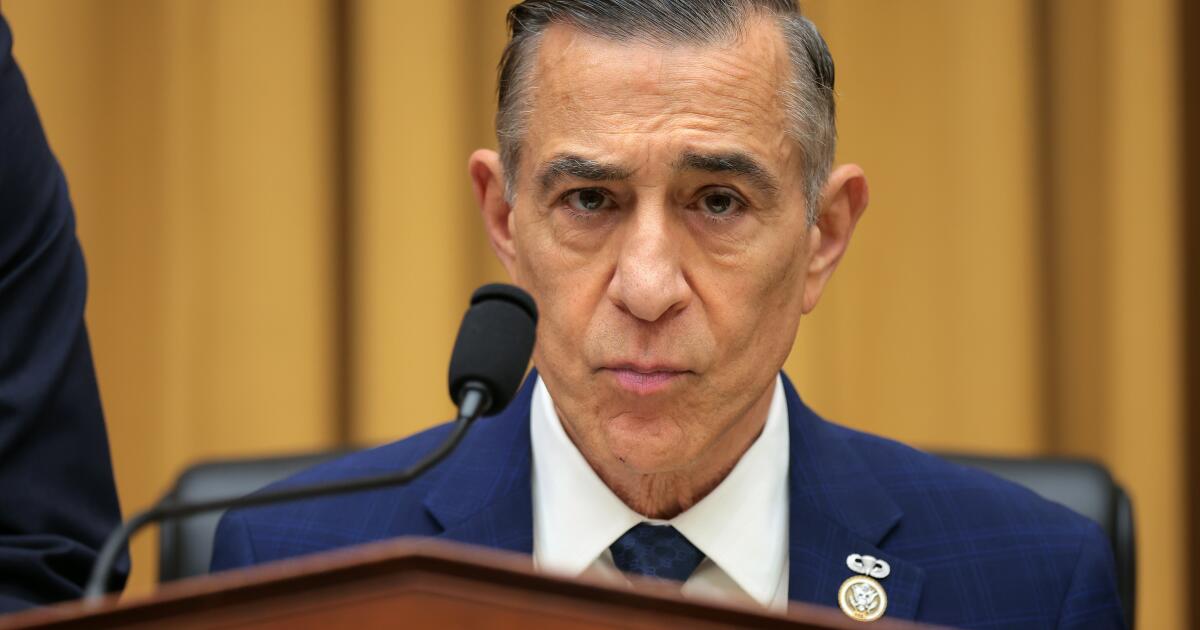WASHINGTON — The House of Representatives passed a bill Wednesday brought by one California Republican to limit the ability of federal judges to pass rulings that have national impact — a pet issue that President Trump has seized on as his administration faces a litany of lawsuits since taking office.
“In recent years, it has become glaringly obvious that federal judges are overstepping their constitutional bounds,” Rep. Darrell Issa (R-Bonsall) said on the House floor Wednesday. “A district judge needs to be confined to their district and to people who are in their district.”
The No Rogue Rulings Act would limit federal judges’ ability to issue nationwide injunctions by curtailing their ability to make decisions that affect people outside their district.
Democratic leaders ordered their party to vote against the bill and instead forced a vote to replace it with a resolution condemning a rise in violence against federal judges — including in rhetoric from Trump and his advisor Elon Musk. The resolution failed.
The bill passed with all but one Republican vote. Every Democrat voted against it.
“Since President Trump has returned to office, left-leaning activists have cooperated with ideological judges who they have sought out to take their cases and weaponized nationwide injunctions to stall dozens of lawful executive actions and initiatives,” Issa said in his floor speech.
Trump offered his support for the idea weeks ago, posting on his social media platform Truth Social, “Unlawful Nationwide Injunctions by Radical Left Judges could very well lead to the destruction of our Country!”
Issa blasted federal judges for the myriad injunctions against Trump’s executive actions. When introducing the bill to the House Judiciary Committee, he brought a chart, pointing to the 64 injunctions Trump received in his first term — far above former Presidents Biden (14), Obama (12) or Bush (6).
“The injunctions are nothing more than partisan judicial overreach and have disrupted the president’s ability to carry out his lawful constitutional duty,” Issa said at the committee hearing. “This has allowed activist judges to shape national policy across the entire country … something this Constitution never contemplated.”
But Democrats argue that federal judges are doing their jobs, and that curbing their ability could cause chaos if their rulings are effective only within certain districts and not others.
“If you don’t like the injunctions, don’t do illegal, unconstitutional stuff — it’s that simple,” Rep. Pramila Jayapal (D-Wash.) said Wednesday. “Nationwide injunctions play an essential role in protecting our democracy and holding the political branches accountable.”
Lena Zwarensteyn, advisor to the Leadership Conference on Civil and Human Rights, which joined more than 50 other organizations in sending a letter to Congress opposing the measure, called it “rigging the judiciary in favor of Trump.”
“Congressional efforts that seek to undermine the independence and fairness of the judiciary are blatant attempts to appease a president who thinks he’s king, and they seek to usher in autocracy in ways that should alarm everyone,” Zwarensteyn said in a statement.
Politicians from both parties have grumbled over the years about any one federal judge’s ability to pass rulings that have national impact. Already, nationwide injunctions from district judges often are appealed and, if reversed, wind up in the Supreme Court.
The bill now heads to the Senate.
